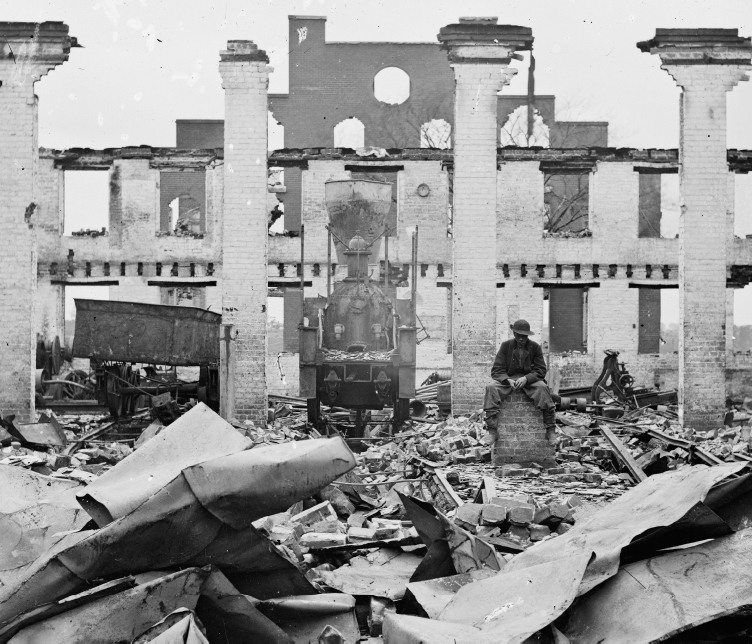Exploring American Histories: Printed Page 413
Exploring American Histories, Value Edition: Printed Page 343
The Final Battles and the Promise of Peace
In the spring of 1864, the war entered its final stage. That March, Lincoln placed General Grant in charge of all Union forces, and he embarked on a strategy of total war, including attacks against civilian as well as military targets. Grant was willing to accept huge casualties in order to achieve victory. Over the next year, he led his troops overland through western Virginia in an effort to take Richmond. At the same time, he ordered General Sherman to head south through Georgia, destroying the remnants of the plantation system.
Grant’s troops headed toward Richmond, where Lee’s army controlled strong defensive positions. The Confederates won narrow victories in May 1864 at the Battles of the Wilderness and Spotsylvania Court House. In June, 7,000 Union soldiers were killed in one hour during a frontal assault at Cold Harbor, Virginia, where Confederates once again turned back the Union army. But Grant continued to push forward. Although Lee lost fewer men (31,000 casualties at Cold Harbor versus 55,000 for the Union), his army was melting away with each so-called victory.
The battles took a terrible toll on soldiers on both sides. Union troops and civilians called Grant “the butcher” for his seeming lack of regard for human life. Grant, however, was not deterred. He laid siege to Petersburg in June 1864, where both sides lived in trenches and tunnels for months on end. That August, Sherman also laid siege to Atlanta, but on September 2 he ordered his troops out of the trenches, swept around the city, and destroyed the roads and rails that connected it to the rest of the Confederacy. When General John B. Hood and his southern troops abandoned their posts, Sherman telegraphed Lincoln: “Atlanta is ours, and fairly won.” The victory cut the South in two.
Sherman then led his troops on a 300-mile marchto the Atlantic coast and north through the Carolinas. Embracing the strategy of total war, his troops cut a path of destruction 50 miles wide during their “March to the Sea,” destroying crops, livestock, and houses before they reached Savannah in late December. Nearly 18,000 enslaved men, women, and children left the ruined plantations and sought to join Sherman’s victorious troops. To the fleeing slaves’ dismay, soldiers refused to take them along. Worse, some Union soldiers abused African American men, raped black women, or stole their few possessions. Angry Confederates captured many of those who were turned away, killing some and reenslaving others.

Explore
See Document 13.5 for a description of the destruction of Columbia, South Carolina.
Sherman’s callous actions caused a scandal in Washington. In January 1865, Lincoln dispatched Secretary of War Edwin Stanton to Georgia to investigate the charges. At an extraordinary meeting in Savannah, Stanton and Sherman met with black ministers to hear their complaints and to ask what newly emancipated African Americans wanted. The ministers spoke movingly of the war lifting “the yoke of bondage.” Freed blacks, they argued, “could reap the fruit of their own labor” and, if given land, “take care of ourselves, and assist the Government in maintaining our freedom.” In response, Sherman issued Field Order Number 15, setting aside more than 400,000 acres of captured Confederate land to be divided into small plots for former slaves. Although Sherman’s order proved highly controversial, it suggested that the Civil War might, in the end, be a revolutionary force for change.
As defeat loomed, even Confederate leaders began to talk of emancipating the slaves. Jefferson Davis called for recruiting slaves into the army, with their payment to include freedom for themselves and their families. The Confederate Congress passed such a law in early 1865, but it was too late to make any difference. Still, the very idea suggested that the Civil War had turned southern society upside down.
In early April 1865, with Sherman heading toward Raleigh, North Carolina, Grant captured Petersburg and then drove Lee and his forces out of Richmond. In one of the war’s most dramatic moments, seasoned African American troops led the final assault on the city and were among the first Union soldiers to enter the Confederate capital. On April 9, after a brief engagement at Appomattox Court House, Virginia, Lee surrendered to Grant with fewer than 30,000 soldiers remaining under his command. Within hours, his troops began heading home. Although Confederate soldiers continued to engage Union forces in North Carolina and west of the Mississippi, the Civil War, for all intents and purposes, had come to an end.
The legal abolition of slavery was initiated in Washington a few months before Lee’s surrender. Following on the petitions submitted by the Women’s National Loyal League, Congress passed the Thirteenth Amendment to the U.S. Constitution on January 31, 1865, prohibiting slavery and involuntary servitude anywhere in the United States. Although it still re-quired approval by three-quarters of the states, wartime experiences made ratification likely. Some states and cities had already enacted laws to ease racial inequities. Ohio, California, and Illinois repealed statutes barring blacks from testifying in court and serving on juries. San Francisco, Cincinnati, Cleveland, and New York City desegregated their streetcars. In May 1865, Massachusetts passed the first comprehensive public-accommodations law in U.S. history, ensuring equal treatment in theaters, stores, schools, and other social spaces. With the final surrender of the Confederacy, many Northerners were hopeful that the nation reunited would be stronger and more just.
Review & Relate
|
What role did African Americans play in the defeat of the South? |
How did the Union win the war? How did attitudes toward African Americans change in the final year of the war? |